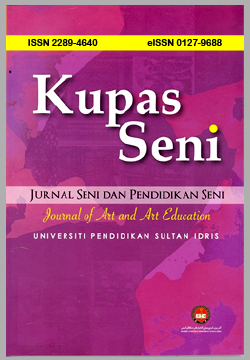Children's Power to Environmental Sustainability Through the Development of Gamification
DOI:
https://doi.org/10.37134/kupasseni.vol12.1.7.2024Keywords:
Environment, Awareness, Education, Children, GamificationAbstract
Developing a generation that cares about the environment, children need to master environmental sustainability. Involving children in learning about environmental sustainability not only teaches them but also teaches them how to see and act well towards their environment. In addition, this gamification can attract the interest of children because in this era, we are already aware that with the development of technology, it has an impact on the current generation. The existence of this gamification can definitely increase the knowledge of these children because the way the approach can attract their interest to learn it. Further, gamification is the use of elements that have game characteristics such as playing video games that are applied in indirect learning activities or the process of adding games or similar elements in a matter (as a task) that aims to encourage participation. Furthermore, the medium of delivering knowledge and information about the environment also needs to be taken into account to ensure it reaches the target group. Knowledge is the most important component to be explored and possessed by children in increasing awareness of the environment. Among the relationships of gamification with children is being able to build critical and creative thinking skills. This is said to be so because, through gamification, this will attract children to think outside the box. Gamification works as a method that applies game elements in a subject in order to create a feeling and enjoyable playing experience. Therefore, gamification is not just a game for entertainment but can also be used as an educational media for children.
Downloads
References
Chew Le., & Suziyani. (2021). Kemahiran Guru dalam Mengintegrasi Teknologi Maklumat dan Komunikasi dalam Pembelajaran di Prasekolah. Journal Dunia Pendidikan.
Dias, J. G. (2017). Environmental sustainability measurement in the travel & tourism competitiveness index: An empirical analysis of its reliability. Ecological Indicators, 73(1), 589–596. https://doi.org/10.1016/j.ecolind.2016.1
Fakhri, Rosli., & Hairullfazli. (2021). Kelestarian Alam Sekitar Dan Pemiliharaan Menurut Maqasid Syariah. International Conference On Syariah & Law2021(ICONSYAL 2021)-.
Haliza Abdul Rahman. (2017). Usaha dan Cabaran Dalam Mengaplikasikan Pendidikan Alam Sekitar Dalam Sistem Persekolahan di Malaysia. Asian Journal of Environment, History and Heritage.
Ithnin, H. (2020). Kelestarian Atasi Kemusnahan. Retrieved from my Metro: https://www.hmetro.com.my/dekotaman/2020/10/626791/kelestarian-atasi-kemusnahan
Mauri, C. (2020). What comes to mind when you think of sustainability? Worldwide Hospitality and Tourism Themes, 12(4), 459–470. https://doi.org/10.1108/WHATT-05-2020-0021
Mohd Faruze., & Norah. (2020). Amalan Gamifikasi dalam Pengajaran dan Pemudahcaraan Guru-Guru Sekolah Rendah di Negeri Johor. Innovative Teaching and Learning Journal.
Muhamad Firdaus Ramli., Noor Alhusna Madzlan., Abdul Aziz Zalay Zali., & Ridzuan Hussin. (2020). COGNITIVE THERAPY TECHNIQUE OF PEOPLE WITH DISABILITIES THROUGH VISUAL ARTS EDUCATION APPROACH. European Journal of Molecular & Clinical Medicine, 7(2), 3952-3966.
Musa, R., Ramli, M., Mohd Khairuddin, N., & Abindinhazir, Z. (2019). Eksplorasi lakaran bertema kenderaan serta kesan terhadap kreativiti kanak-kanak. KUPAS SENI: Jurnal Seni Dan Pendidikan Seni, 7, 72-80. Retrieved from http://ejournal.upsi.edu.my/index.php/JSPS/article/view/2708
Rahimah Wahid. (2019). Kaedah Gamifikasi Sebagai Alternatif Pengajaran Dan Pembelajaran Dalam Kursus Berkaitan Alam Sekitar. Journal Of Education And Social Sciences.
Ramin Hajianfard., & Muhamad Firdaus Ramli. (2023). The Reflection of Peace and Violence in Visual Art Works of Malaysian Artists, Peace Review, DOI: 10.1080/10402659.2023.2188115
Ramli, M, F.; Rambeli, N.; Rahmatulah, B, Mustafa, M, and Yassin, S. (2021). Development of Teachers in Visual Art Sketching Skills Approach in the Early Childhood Education Professionalism. Review of International Geographical Education (RIGEO), 11 (5), 469-475.doi:10.48047/rigeo.11.05.48
Ramli, M. F. (2019). Argumentasi Terhadap Pergerakan Fesyen Jalanan Tempatan. KUPAS SENI: Jurnal Seni Dan Pendidikan Seni, 6. Retrieved from http://ejournal.upsi.edu.my/index.php/JSPS/article/view/2278
Ramli, M. F. (2020a). Assigning Features and Experiences During the Physical Movement Control Conditions Throughout Pandemic COVID-19. KUPAS SENI: Jurnal Seni Dan Pendidikan Seni, 8(2), i-iv. https://doi.org/10.37134/kupasseni.vol8.2.editorial.2020
Ramli, M. F. (2020b). Addressing Experiencing Prior To Pre-Control of Physical Movement Affected by COVID-19 Pandemic Issue. KUPAS SENI: Jurnal Seni Dan Pendidikan Seni, 8(1), i-iv. Retrieved from https://ejournal.upsi.edu.my/index.php/JSPS/article/view/5497
Ramli, M. F. (2021). Debating Sensation of Studies During Restriction of Physical Progress Influenced by Coronavirus Disease (COVID-19). KUPAS SENI: Jurnal Seni Dan Pendidikan Seni, 9(1), i-v. https://doi.org/10.37134/kupasseni.vol9.1.editorial.2021
Ramli, M. F. (2022a). Signifying The Continuity of Experience in Confronting the Realm of Visual Art. KUPAS SENI, 10, i-xi. https://doi.org/10.37134/kupasseni.vol10.editorial.2022
Ramli, M. F. (2022b). Exploration of Unity in Dignifying Reviews of Visual Art. KUPAS SENI, 10, i-ix. https://doi.org/10.37134/kupasseni.vol10.sp.editorial.2022
Ramli, M. F. (2023). Defining an Understanding of Art Issues from A Cross-Cultural Teaching Perspective. KUPAS SENI, 11(1), i-v. https://doi.org/10.37134/kupasseni.vol11.1.editorial.2023
Ramli, M. F., & Musa, R. (2020a). An exploration of thematic sketch through visual arts activities towards the preschool children. Southeast Asia Early Childhood Journal, 9(2), 132-143. Retrieved from https://ejournal.upsi.edu.my/index.php/SAECJ/article/view/3920
Ramli, M. F., & Musa, R. (2020b). Ekplorasi seni visual melalui aktiviti lakaran asas terhadap kanak-kanak prasekolah. Jurnal Pendidikan Awal Kanak-Kanak Kebangsaan, 9, 35-47. Retrieved from http://ejournal.upsi.edu.my/index.php/JPAK/article/view/3712
Ramli, M. F., Musa, R., Mohd Khairuddin, N. E., & Basiron, N. (2020). Cultural Sharing Through Visual Art Exhibition ‘Dalam Bingkai’ by JSRB-UPSI with FSRD-ISBI. EDUCATUM Journal of Social Sciences, 6(2), 25-34. https://doi.org/10.37134/ejoss.vol6.2.3.2020
Ramli, Muhamad Firdaus and Zalay @ Zali, Abdul Aziz and Basiron, Nurazry. (2019). Pendekatan pendidikan seni visual terhadap terapi kognitif orang kurang upaya / Muhamad Firdaus Ramli...[et al.]. In: e-proceedings Design Decoded 2019, 19 - 20 June 2019, Mangrove Tourism Complex, Sungai Merbok 08000 Sungai Petani, Kedah.
Sharmin, F., Sultan, M. T., Badulescu, A., Bac, D. P., & Li, B. (2020). Millennial tourists’ environmentally sustainable behavior towards a natural protected area: An integrative framework. Sustainability, 12(20), 8545.
Suhaimi, K. (2017). 7 Kesan Buruk Gajet Dan Telefon Pintas Terhadap Otak Kanak-Kanak. Retrieved from Iluminasi: https://iluminasi.com/bm/kanak-kanak-mahu-tetak-datuk-sampai-mati-angkara-telefon-pintar.html
Yasir, I. (2022). Mufti Wilayah Perjelas Tuntutan Penjagaan Alam Sekitar Menurut Islam. Retrieved from Siakap Keli: https://siakapkeli.my/2022/10/28/mufti-wilayah-perjelas-tuntutan-penjagaan-alam-sekitar-menurut-islam/
Zhang, Q., & Ramli, M. F. (2023). Aesthetic Education for Silver Hair: A Study of Chinese Elderly University Students’ Art Learning Needs. Journal of Education and Educational Research, 6(3), 47-50. https://doi.org/10.54097/0fv1m271
Downloads
Published
How to Cite
Issue
Section
License
Copyright (c) 2024 Nur Syafiqah Atierah Muhamad Rodzi

This work is licensed under a Creative Commons Attribution-NonCommercial-ShareAlike 4.0 International License.





